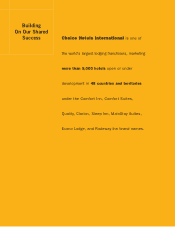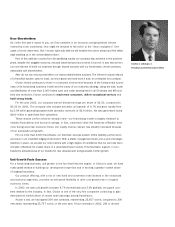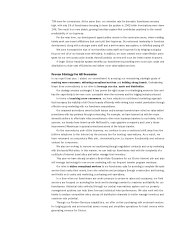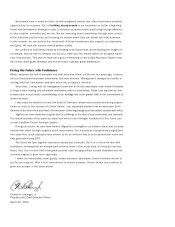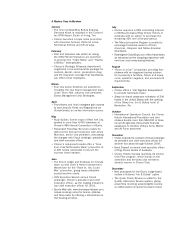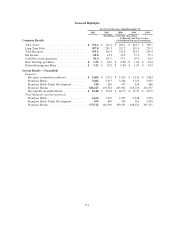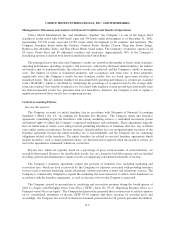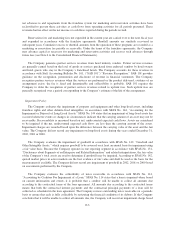Comfort Inn 2002 Annual Report Download - page 11
Download and view the complete annual report
Please find page 11 of the 2002 Comfort Inn annual report below. You can navigate through the pages in the report by either clicking on the pages listed below, or by using the keyword search tool below to find specific information within the annual report.net advances to and repayments from the franchise system for marketing and reservation activities have been
reclassified to present these activities as cash flows from operating activities for all periods presented. These
revisions had no effect on the net income or cash flows reported during the periods revised.
Reservation fees and marketing fees not expended in the current year are carried over to the next fiscal year
and expended in accordance with the franchise agreements. Shortfall amounts are similarly recovered in
subsequent years. Cumulative excess or shortfall amounts from the operation of these programs are recorded as a
marketing or reservation fee payable or receivable. Under the terms of the franchise agreements, the Company
may advance capital as necessary for marketing and reservation activities and recover such advances through
future fees (see Note 6 to the Consolidated Financial Statements).
The Company generates partner services revenues from hotel industry vendors. Partner services revenues
are generally earned based on the level of goods or services purchased from endorsed vendors by hotel owners
and hotel guests who stay in the Company’s franchised hotels. The Company accounts for these revenues in
accordance with Staff Accounting Bulletin No. 101, (“SAB 101”) “Revenue Recognition.” SAB 101 provides
guidance on the recognition, presentation and disclosure of revenue in financial statements. The Company
recognizes partner services revenues when the services are performed or the product delivered, evidence of an
arrangement exists, the fee is fixed and determinable and collectibility is probable. SAB 101 requires the
Company to defer the recognition of partner services revenues related to upfront fees. Such upfront fees are
generally recognized over a period corresponding to the Company’s estimate of the life of the arrangement.
Impairment Policy
The Company evaluates the impairment of property and equipment and other long-lived assets, including
franchise rights and other definite-lived intangibles, in accordance with SFAS No. 144, “Accounting for the
Impairment or Disposal of Long-Lived Assets.” SFAS No. 144 states that an impairment of long-lived assets has
occurred whenever events or changes in circumstances indicate that the carrying amount of an asset may not be
recoverable. Recoverability is measured based on net, undiscounted expected cash flows. Assets are considered
to be impaired if the net, undiscounted expected cash flows are less than the carrying amount of the assets.
Impairment charges are recorded based upon the difference between the carrying value of the asset and the fair
value. The Company did not record any impairment on long-lived assets during the years ended December 31,
2002, 2001 or 2000.
The Company evaluates the impairment of goodwill in accordance with SFAS No. 142, “Goodwill and
Other Intangible Assets,” which requires goodwill to be assessed on at least an annual basis for impairment using
a fair value basis. Because the Company operates in one reporting segment in accordance with SFAS No. 131,
“Disclosures about Segments of an Enterprise and Related Information” and related interpretations, the fair value
of the Company’s total assets are used to determine if goodwill may be impaired. According to SFAS No. 142,
quoted market prices in active markets are the best evidence of fair value and shall be used as the basis for the
measurement if available. The Company did not record any impairment of goodwill in 2002, 2001 or 2000 based
on assessments performed by the Company.
The Company evaluates the collectibility of notes receivable in accordance with SFAS No. 114,
“Accounting by Creditors For Impairment of a Loan.” SFAS No. 114 states that a loan is impaired when, based
on current information and events, it is probable that a creditor will be unable to collect all amounts due
according to the contractual terms of the loan agreement. All amounts due according to the contractual terms
means that both the contractual interest payments and the contractual principal payments of a loan will be
collected as scheduled in the loan agreement. The Company reviews outstanding notes receivable on a periodic
basis to ensure that each is fully collectible by reviewing the financial condition of its debtors. If the Company
concludes that it will be unable to collect all amounts due, the Company will record an impairment charge based
F-3


